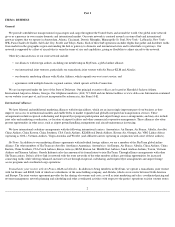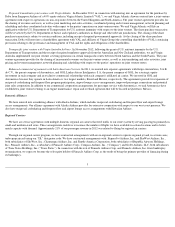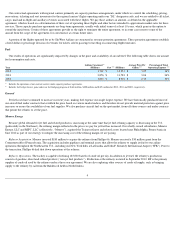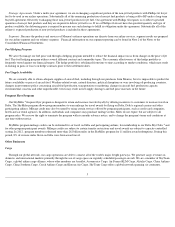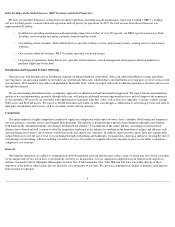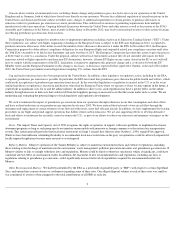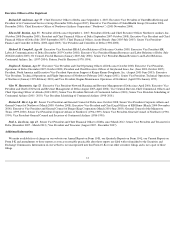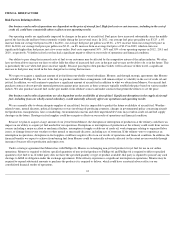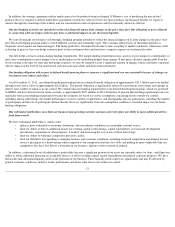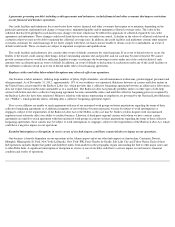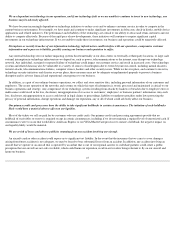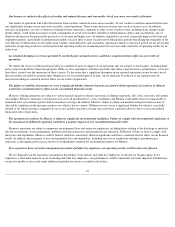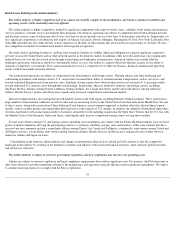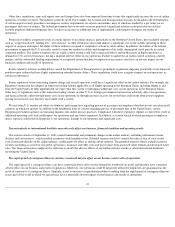Delta Airlines 2012 Annual Report Download - page 14
Download and view the complete annual report
Please find page 14 of the 2012 Delta Airlines annual report below. You can navigate through the pages in the report by either clicking on the pages listed below, or by using the keyword search tool below to find specific information within the annual report.
Concern about aviation environmental issues, including climate change and greenhouse gases, has led to taxes on our operations in the United
Kingdom and in Germany, both of which have levied taxes directly on our customers. We may face additional regulation of aircraft emissions in the
United States and abroad and become subject to further taxes, charges or additional requirements to obtain permits or purchase allowances or
emission credits for greenhouse gas emissions in various jurisdictions. This could result in taxation or permitting requirements from multiple
jurisdictions for the same operations. Ongoing bilateral discussions between the United States and other nations as well as discussions at the ICAO
Assembly and Conference of the Parties, most recently in Doha, Qatar in December 2012, may lead to international treaties or other actions focusing
on reducing greenhouse gas emissions from aviation.
The European Union has required its member states to implement regulations including aviation in its Emissions Trading Scheme (“ETS”).
Under
these regulations, any airline with flights originating or landing in the European Union is subject to the ETS and, beginning in 2012, is required to
purchase emissions allowances if the airline exceeds the number of free allowances allocated to it under the ETS. In November 2012, the European
Commission proposed to defer airlines' compliance obligations for non-European flights and suspended related non-compliance sanctions until after
the 38th ICAO Assembly to be held in late September and early October of 2013. The European Commission has taken this action to give the process
at ICAO time to come to a conclusion. Under the proposal, airlines will not face enforcement action if they do not surrender allowances for their
emissions related to flights operated to and from non-EU destinations; however, all intra-EU flights on any carrier (based in the EU or not) will still
have to comply with the requirements of the ETS. Legislation is required to implement this proposed change and a co-decision by both the EU
Member States and the European Parliament on this change is necessary. A decision is expected before April 2013. Further, at the end of November
2012, the United State government enacted legislation exempting U.S. airlines from the ETS.
Cap and trade restrictions have also been proposed in the United States. In addition, other legislative or regulatory action, including by the EPA,
to regulate greenhouse gas emissions is possible. In particular, the EPA has found that greenhouse gases threaten the public health and welfare, which
could result in regulation of greenhouse gas emissions from aircraft. In the event that legislation or regulation is enacted in the U.S. or in the event
similar legislation or regulation is enacted in jurisdictions other than the European Union where we operate or where we may operate in the future, it
could result in significant costs for us and the airline industry. In addition to direct costs, such regulation may have a greater effect on the airline
industry through increases in fuel costs that could result from fuel suppliers passing on increased costs that they incur under such a system. We are
monitoring and evaluating the potential impact of such legislative and regulatory developments.
We seek to minimize the impact of greenhouse gas emissions from our operations through reductions in our fuel consumption and other efforts
and have realized reductions in our greenhouse gas emission levels since 2005. We have reduced the fuel needs of our aircraft fleet through the
retirement and replacement of certain elements of our fleet and with newer, more fuel efficient aircraft. In addition, we have implemented fuel saving
procedures in our flight and ground support operations that further reduce carbon emissions. We are also supporting efforts to develop alternative
fuels and efforts to modernize the air traffic control system in the U.S., as part of our efforts to reduce our emissions and minimize our impact on the
environment.
Noise . The Airport Noise and Capacity Act of 1990 recognizes the rights of operators of airports with noise problems to implement local noise
abatement programs so long as such programs do not interfere unreasonably with interstate or foreign commerce or the national air transportation
system. This statute generally provides that local noise restrictions on Stage 3 aircraft first effective after October 1, 1990, require FAA approval.
While we have had sufficient scheduling flexibility to accommodate local noise restrictions in the past, our operations could be adversely impacted if
locally-imposed regulations become more restrictive or widespread.
Refinery Matters . Monroe's operation of the Trainer Refinery is subject to numerous environmental laws and extensive regulations, including
those relating to the discharge of materials into the environment, waste management, pollution prevention measures and
greenhouse gas emissions. If
Monroe violates or fails to comply with these laws and regulations, Monroe could be fined or otherwise sanctioned, which, if significant, could have
a material adverse effect on our financial results. In addition, the enactment of new environmental laws and regulations, including any laws or
regulations relating to greenhouse gas emissions, could significantly increase the level of expenditures required for environmental matters for
Monroe.
Other Environmental Matters . We had been identified by the EPA as a potentially responsible party (a “PRP”) with respect to certain Superfund
Sites, and entered into consent decrees or settlements regarding some of these sites. Our alleged disposal volume at each of these sites was small or
was considered de minimis when compared to the total contributions of all PRPs at each site.
9





